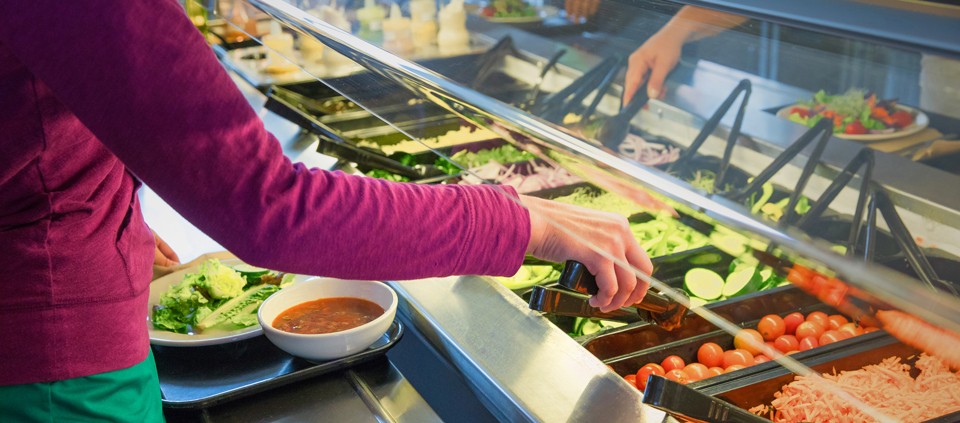Six Tips for Eating Clean Without Going Overboard

It seems intuitive, right? A diet filled with clean, nutrient-dense, whole foods is the way to go, individually and globally. But, for several years, an enthusiastic backlash has been lobbed at clean eating and those who promote it. Before I dove into the debate, I didn’t think eating clean could be controversial. I was wrong.
Eating clean has become a movement, with superstars, their followers, and media-fueled competition for attention. This level of media heat can breed extremes. Yogis in search of a diet and lifestyle to support their yoga practice and overall balance, in an unbalanced world, may be susceptible to eating so “clean” that they become malnourished. Moderation, as my friend and mentor Stephen Cope says, is akin to standing in the fire between the beckoning poles of too much and too little.
Is clean eating a controversy about nothing? No—it’s good for us to debate what to eat, and what is really healthy, if we can do it with respect and without name-calling and labeling. Is clean eating a generator of eating disorders? It might be, particularly if the propensity is there.
When you eliminate entire categories of food—be they whole grains, dairy and animal products, fat, or fruit—for more than a few days, you quickly increase your risk of nutritional inadequacy. While it is possible to eat a super-clean, healthy, balanced diet, each time you eliminate a nutrient-dense food category, you increase the potential for problems. Add in physical activity—which, if done daily, increases your energy, protein, and nutrient needs, sometimes by a lot—and it’s easy to slip into chronic undernourishment. Over time, that can lead to serious issues with bone loss, digestion, and your overall risk of disease.
What to do? Here are six tips for navigating clean eating while maintaining long-term health.
Don’t feel bad for wanting to eat and live clean. It’s not over the top to be concerned about the toxicity of our food. We live in the time of Flint, Michigan (where the public water supply was contaminated with toxic levels of lead). We live in a time when the first White House Report on the link between environmental toxicity and cancer attributed about 6 percent of cancers to toxicity. Cleanliness of our food supply is an issue, and there’s nothing wrong with being concerned—for yourself and our world. My friend and colleague, visionary nutritionist Kathie Madonna Swift, says, “Whether we are healthcare professionals or consumers, we should all be engaged in the stewardship of the earth. We cannot ignore the scientific data from organizations, both here in the US and around the globe, showing that the toxic burden of our food supply must be reduced.” It is a real and important issue.
Make sure you get enough nutrients. To be healthy and avoid chronic disease, follow the basics of healthful eating. We all need adequate protein. The Institute of Medicine of the National Institutes of Health says we need about 50 grams per day—men a little more, women a little less (a deck-of-cards size serving of animal protein has about 21 grams). That’s before we figure in increases due to higher levels of physical activity, healing, and other factors. We need about 120 to 130 grams of carbohydrate to keep our brain and body operating (a slice of bread and a half banana each contain about 15 grams). Being physically active (as many vinyasa-oriented yoga practitioners are) can nearly double your needs as far as protein, energy, and other nutrients.
The cleanest thing you can do is eat fruit and vegetables. A plant-based diet should ideally contain more plants than most Americans eat by a long shot. The Centers for Disease Control suggests that we generally eat between nine and 11 servings of fruits and vegetables each day, a science-based recommendation. If you don’t eat that much, and you can tolerate more, what can you do to ease your way up?
Be aware of the human tendency to be compulsive. For some reason, it’s human nature to believe that, if some is good, more must be better. This belief runs deep and, from my observation, is independent of how smart or learned you are. For most people, restricting is actually easier than moderation. As you practice making the choices to support your healthiest self, know that moderation—not too much, not too little, of anything—tends to work best.
Detox—but do it gently. Detoxification is a human process that’s happening all the time in your liver, gastrointestinal tract, and other organs. You can help it out with a modest seasonal clean-up, which is all the detox that most of us need. In our detox programs at Kripalu, we use food and moderation. A sabbatical of just a few days from sugar, alcohol, salt, processed food, and meat, in favor of simple, whole-food, plant-based eating—greens, beans, nuts and seeds, avocados, vegetable soups and stews, plenty of water and herbal tea—is all you need to dramatically change how you look and feel. Gentle yoga, a sauna, letting go of things in life that no longer serve us (emotional detox), and just taking a break from the 24-7 digital demands of modern life are also clean-living basics that help us feel well and think more clearly.
Avoid moralizing. This is at the heart of the clean-eating controversy, and the part that the media gloms onto. Labeling whole groups of people as being unethical overeaters or having eating disorders is just unhelpful. Who doesn’t hate unsolicited advice about food, particularly when you’re about to take your first joy-filled bite? Proselytizing about diet is not the best way to make friends and influence people (ask my long-suffering husband).
“It doesn’t have to be complicated or controversial to eat clean,” says my colleague Lisa B. Nelson, MD, Kripalu’s Director of Medical Education. “To me, that just means whole, minimally processed, or unprocessed foods. Clinical studies, from PREDIMED to the Diabetes Prevention Program, show that Michael Pollan got it right the first time: Eat food (real, whole foods), not too much, mostly plants. Following those simple guidelines will help the vast majority of people improve their health and dramatically reduce their risk of type 2 diabetes, heart disease, cancer, and stroke.”
Perhaps what’s most needed to declaw the clean-eating controversy is a nice warm cup of compassion. How about we all just ease off and let everyone eat what they like, while acknowledging the powerful connection between diet and health?
Annie B. Kay, MS, RDN, E-RYT 500, C-IAYT, is an author, nutritionist, Kripalu faculty member, and important voice in whole-foods nutrition and yoga.
Full Bio and Programs